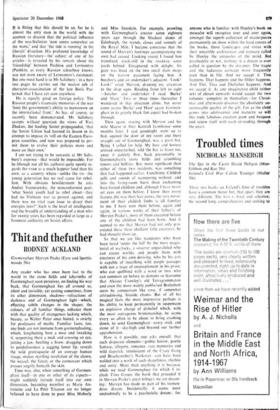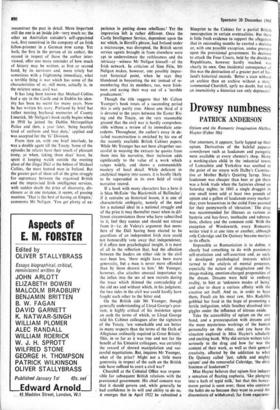Troubled times
NICHOLAS MANSERGH
The Spy in the Castle David Neligan (Mao- Gibbon and Kee 30s) Ireland's Civil War Calton Younger (Muller 50s) These two books on Ireland's time of troubles have a common theme but, that apart, they are very different. The lirst is brief and selective; the second long, comprehensive and seeking to
reconstruct the past in detail. More- important still the one is an inside job—very much so; the other an Australian outsider's self-appointed task, first conceived in the company of an Irish fellow-prisoner in a German Pow camp. Yet both, the first in the person of its author, the second in respect of those the author inter- viewed, offer one more reminder of how much of history may be written, at first or second hand, by its survivors and, more tritely but sometimes with a frightening immediacy, what a terrible thing is war which has some of the characteristics of or, still more, actually is, in the strictest sense, civil war.
It has long been known that Michael Collins had a spy in the Castle and in Dublin his iden- tity has been no secret for many years. Now he has written his story. Prefaced by brief but rather moving boyhood memories of County Limerick, Mr Neligan's book really begins when in 1918 he joined the Dublin Metropolitan Police and then, a year later, 'being heartily tired of uniform and beat duty,' applied and was accepted for the `G' Division.
From then on, with one brief interlude, he was a double agent till the Treaty. Some of the episodes he relates have their touch of pleasant irony, as when, taking three days' leave, he spent it keeping watch outside the meeting place of the illegal Dail at the behest of Michael Collins, the most hunted man in Ireland. But the greater part of them tell of the grim struggle for supremacy between the organised British and the improvised Irish intelligence services, with sudden death the price of discovery, dis- closure or in one instance, it seems, of passing mention. 'That is the best of having an Empire,' comments Mr Neligan. `You get plenty of ex-
perience in putting down rebellions.' Yet the impression left is rather different. Once the Castle Intelligence Service, dependent upon the Ric which, in Birrell's phrase, had Ireland under a microscope, was disrupted, the British secret
service agents brought in from elsewhere were apt to underestimate the ruthlessness and the intricacy—witness Mr Neligan himself—Of the Irish network. In criticism of Sinn Rin, Mr Neligan makes, however, one possibly impor- tant historical point, when he says they blundered in boycotting the RIC instead of re- membering that its members, too, were Irish- men and easing their way out of a 'terrible predicament.'
Though the title suggests that Mr Calton Younger's book treats of a succeeding period this is only partly true. About one third of it is devoted to the years between the Easter Ris- ing and the Treaty, on the very reasonable ground that the civil war is hardly comprehen- sible without a review of its immediate ante- cedents. Throughout, the author's essay in de- tailed reconstruction is enriched by his use of the recently available British Cabinet papers. While Mr Younger has not been altogether suc- cessful in weaving the extracts he quotes from them into his narrative, their inclusion adds significantly to the value of a work which ranges widely, and shows a commendable mastery of local detail. While deficient in analytical inquiry into causes, it is hardly likely to be superseded in its own field of vivid narrative record.
If a book with many characters has a hero it is Sean McEoin• 'the Blacksmith of Ballinalee'; if it contains an historical lesson, it is one of characteristic ambiguity, namely of the need for a national ideal in a national struggle and of the price it may thereafter exact when in dif- ferent circumstances those who have subscribed to it, feel they cannot and should not retreat from it—i.e. de Valera's argument that mem- bers of the Dail having been elected to be guardians of an independent Irish state could not honourably vote away that independence; if it offers new psychological insight, it is most of all in the reflection that, had the affection between the leaders on either side in the civil wan, been less, 'there might have been more generosity, but a man is never more offended than by those dearest to him.' Mr Younger, however, also attaches unusual importance to the influx into the IRA of new recruits during the truce which thinned the comradeship of the old IRA and without which, in his judgment, the two sides in the civil war could hardly have fought each other to the bitter end.
On the British side Mr Younger, though generally understanding of Lloyd George's posi- tion, is highly critical of his insistence upon an oath the terms of which, so Lloyd George told his Cabinet colleagues after the signature of the Treaty, 'are remarkable and are better in-many respects than the terms of the Oath of Allegiance ordinarily required in Great Britain.' This, in so far as it was true and not for the benefit of his Unionist colleagues, was certainly the reward of shrewd manipulation and suc- cessful negotiations. But, inquires- Mr Younger, what of the price? Might not a little more generosity in respect of the oath on the British side have sufficed to avert a civil war?
Churchill at the Colonial Office was respon- sible for subsequent British relations with the provisional government. His chief concern was that it should govern and, while generally he had confidence in its will and ability to do so, it emerges that in April 1922 he submitted a blueprint to the Cabinet for a partial British reoccupation in certain eventualities. But there is little fresh evidence to support the allegation that in succeeding months he exerted a decisive or, with one possible exception, undue pressure upon the provisional government. Its decision to attack the Four Courts, held by the dissident Republicans, however hardly reached, was clearly its own. One incidental consequence of this was the destruction of a greater part of Ire- land's historical records. 'Better a state without an archive than an archive without a state,' commented Churchill, aptly no doubt, but with an insensitivity a historian can only deprecate!



































 Previous page
Previous page